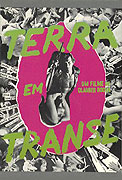Director:
Glauber RochaGuión:
Glauber RochaReparto:
Jardel Filho, Paulo Autran, José Lewgoy, Glauce Rocha, Danuza Leão, Darlene Glória, Maurício do Valle, Zózimo Bulbul, Irma Álvarez, Lauro EscorelStreaming (1)
Sinopsis(1)
Eldorado es un país ficticio latinoamericano donde vive el periodista Pauilo Martins. Dos políticos, un populista y otro conservador luchan por el poder en esta compleja realidad tropical donde nada es lo que parece.
Entre la política y la estética, Glauber Rocha explora la situación de Brasil y de los países latinoamericanos bajo las dictaduras militares, gesto que le ha valió el reconocimiento internacional.
(Filmin)
Reseñas (2)
An interesting and not-so-opaque allegory of the Brazilian political situation, where there are both cowards and strong personalities, and efforts that lead to outcomes different from what might be expected. Although it's about Brazil, even though the country is named Eldorado, it can easily be related to any country. The finale illustrates this beautifully.
()
Contemporary progressive formal techniques in the service of the classical art figure, and satire on current events serving equally well as a statement on the bacchanalia of political power itself. The brilliant combination of both ends of the chain connecting classicism with modernity and the present with eternity. This is best seen in the final few minutes: the narrator's poetry as the auditory background and the visual caesura of the image through frenetic editing, a long close-up of the governor's face drunk with power crystallizes. It is in this overly stylized, overly awkward, and exaggerated gesture that we can precisely perceive the effect of classical art. Its awe-inspiring bombast and unrealistic exaggeration of the image of Napoleon on the revolting Marengo at the top of the Alps, the statue of Teresa of Ávila in an ecstatic whirl of orgasm, and the light draperies carved from stone is presented to us by Rocha (another example is the footage of the shot poet clutching his weapon in an act of self-sacrifice). This represents the main currency of the film. The classical influences (see also the use of poetry) are also demonstrated in the political message that Rocha presents to the audience – here, the most classic genre, tragedy, is the tragedy of an exploited and humiliated people, who are left with either servility or a radical, bloody but great (we are again at the sentimentality of the classics) rebellion against "fate."
()
Galería (19)
Foto © Grupo Novo de Cinema e TV


Anuncio